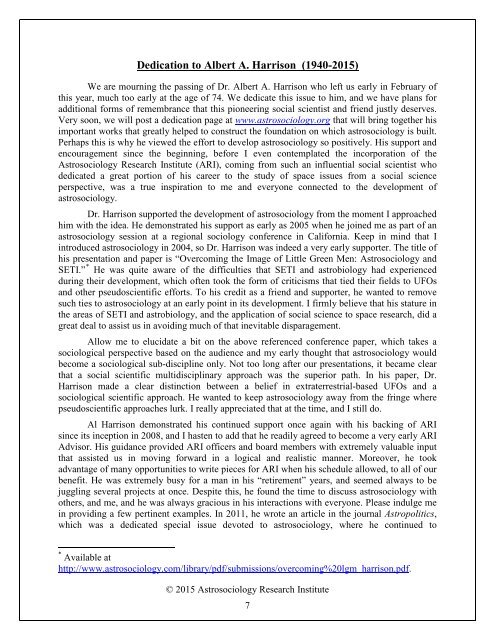THE JOURNAL OF ASTROSOCIOLOGY VOLUME 1
qd9nb3s
qd9nb3s
- No tags were found...
You also want an ePaper? Increase the reach of your titles
YUMPU automatically turns print PDFs into web optimized ePapers that Google loves.
Dedication to Albert A. Harrison (1940-2015)We are mourning the passing of Dr. Albert A. Harrison who left us early in February ofthis year, much too early at the age of 74. We dedicate this issue to him, and we have plans foradditional forms of remembrance that this pioneering social scientist and friend justly deserves.Very soon, we will post a dedication page at www.astrosociology.org that will bring together hisimportant works that greatly helped to construct the foundation on which astrosociology is built.Perhaps this is why he viewed the effort to develop astrosociology so positively. His support andencouragement since the beginning, before I even contemplated the incorporation of theAstrosociology Research Institute (ARI), coming from such an influential social scientist whodedicated a great portion of his career to the study of space issues from a social scienceperspective, was a true inspiration to me and everyone connected to the development ofastrosociology.Dr. Harrison supported the development of astrosociology from the moment I approachedhim with the idea. He demonstrated his support as early as 2005 when he joined me as part of anastrosociology session at a regional sociology conference in California. Keep in mind that Iintroduced astrosociology in 2004, so Dr. Harrison was indeed a very early supporter. The title ofhis presentation and paper is “Overcoming the Image of Little Green Men: Astrosociology andSETI.” * He was quite aware of the difficulties that SETI and astrobiology had experiencedduring their development, which often took the form of criticisms that tied their fields to UFOsand other pseudoscientific efforts. To his credit as a friend and supporter, he wanted to removesuch ties to astrosociology at an early point in its development. I firmly believe that his stature inthe areas of SETI and astrobiology, and the application of social science to space research, did agreat deal to assist us in avoiding much of that inevitable disparagement.Allow me to elucidate a bit on the above referenced conference paper, which takes asociological perspective based on the audience and my early thought that astrosociology wouldbecome a sociological sub-discipline only. Not too long after our presentations, it became clearthat a social scientific multidisciplinary approach was the superior path. In his paper, Dr.Harrison made a clear distinction between a belief in extraterrestrial-based UFOs and asociological scientific approach. He wanted to keep astrosociology away from the fringe wherepseudoscientific approaches lurk. I really appreciated that at the time, and I still do.Al Harrison demonstrated his continued support once again with his backing of ARIsince its inception in 2008, and I hasten to add that he readily agreed to become a very early ARIAdvisor. His guidance provided ARI officers and board members with extremely valuable inputthat assisted us in moving forward in a logical and realistic manner. Moreover, he tookadvantage of many opportunities to write pieces for ARI when his schedule allowed, to all of ourbenefit. He was extremely busy for a man in his “retirement” years, and seemed always to bejuggling several projects at once. Despite this, he found the time to discuss astrosociology withothers, and me, and he was always gracious in his interactions with everyone. Please indulge mein providing a few pertinent examples. In 2011, he wrote an article in the journal Astropolitics,which was a dedicated special issue devoted to astrosociology, where he continued to* Available athttp://www.astrosociology.com/library/pdf/submissions/overcoming%20lgm_harrison.pdf.© 2015 Astrosociology Research Institute7


